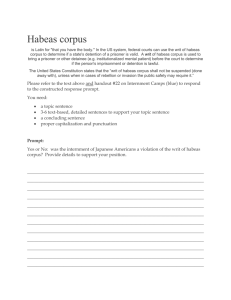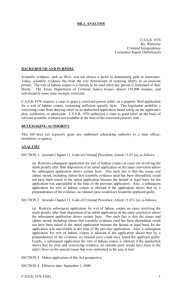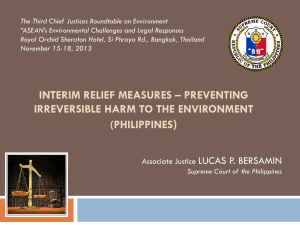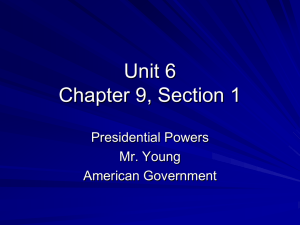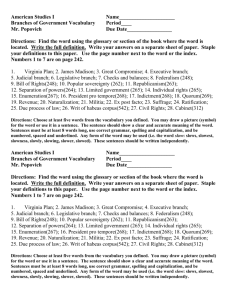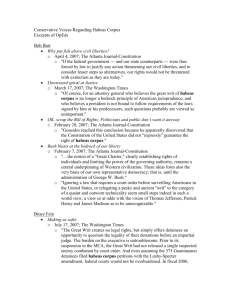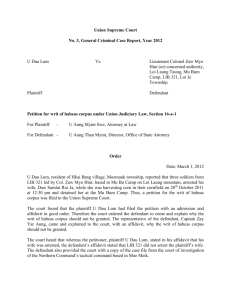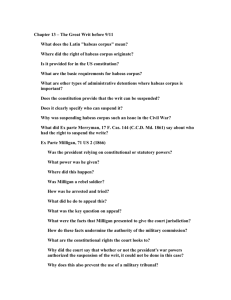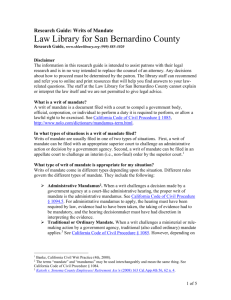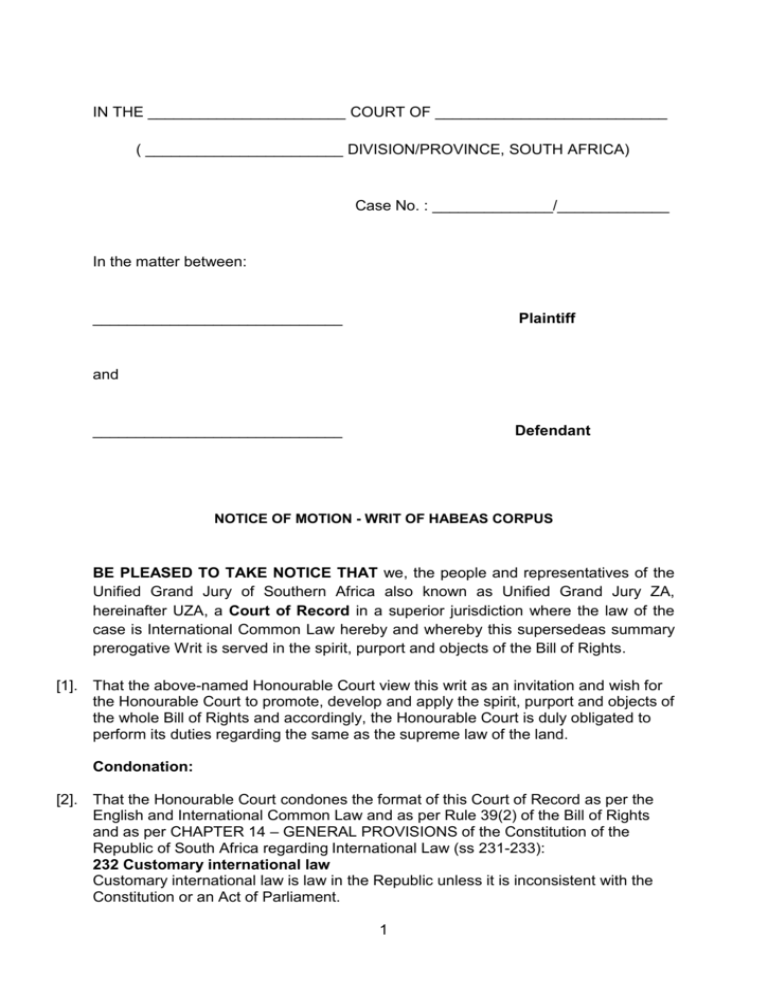
IN THE _______________________ COURT OF ___________________________
( _______________________ DIVISION/PROVINCE, SOUTH AFRICA)
Case No. : ______________/_____________
In the matter between:
_____________________________
Plaintiff
and
_____________________________
Defendant
NOTICE OF MOTION - WRIT OF HABEAS CORPUS
BE PLEASED TO TAKE NOTICE THAT we, the people and representatives of the
Unified Grand Jury of Southern Africa also known as Unified Grand Jury ZA,
hereinafter UZA, a Court of Record in a superior jurisdiction where the law of the
case is International Common Law hereby and whereby this supersedeas summary
prerogative Writ is served in the spirit, purport and objects of the Bill of Rights.
[1]. That the above-named Honourable Court view this writ as an invitation and wish for
the Honourable Court to promote, develop and apply the spirit, purport and objects of
the whole Bill of Rights and accordingly, the Honourable Court is duly obligated to
perform its duties regarding the same as the supreme law of the land.
Condonation:
[2]. That the Honourable Court condones the format of this Court of Record as per the
English and International Common Law and as per Rule 39(2) of the Bill of Rights
and as per CHAPTER 14 – GENERAL PROVISIONS of the Constitution of the
Republic of South Africa regarding International Law (ss 231-233):
232 Customary international law
Customary international law is law in the Republic unless it is inconsistent with the
Constitution or an Act of Parliament.
1
[3]. That the Honourable Court condones language usage as per the Plain Language
Movement in order that a meeting of the minds may occur. In addition, that this is
clearly a case of subject matter jurisdiction. Falsa orthographia, sive falsa
grammatica, non vitiate concessionem. Neither faulty spelling nor faulty grammar will
vitiate a grant or a wish. Neither false Latin nor false English will make a deed void
when the intent of the parties plainly appears as per the Plain Language Movement
and by the Golden Rule that holds all equal before the law.
[4]. Furthermore, this Habeas Corpus Writ ad faciendum, sub jiciendum et recipiendum,
is a fundamental legal safeguard of freedom and the most important English
common law writ as a remedy,
Exposition of Facts:
Definitions: Black’s Law Dictionary 4th Edition
[5]. HABEAS CORPUS AD SUBJICIENDUM - A writ directed to the person detaining
another, and commanding him to produce the body of the prisoner, (or person detained,) with the day and cause of his caption and detention, ad faciendum, sub
jiciendum et recipiendum, to do, submit to, and receive whatsoever the judge or
court awarding the writ shall consider in that behalf. 3 Bl. Comm. 131; 3 Steph.
Comm. 695.
[6]. This is the well-known remedy for deliverance from illegal confinement, called by Sir
William Blackstone the most celebrated writ in the English law, and the great and
efficacious writ in all manner of illegal confinement. 3 Bl. Comm. 129.
[7]. The "great writ of liberty," issuing at common law out of courts of Chancery, King's
Bench, Common Pleas, and Exchequer. Ex parte Kelly, 123 N.J.Eq. 489, 198 A.
203, 207.
[8]. That the writ of habeas corpus provides a judicial remedy for enforcing a
fundamental individual right, the right to personal freedom, which may be defined as
the right to be free of physical restraint that is not justified by law. Whenever
imprisonment violates a constitutional or fundamental right, there is an infringement
of the right to personal freedom as is the case regarding this subject matter.
Actus legis nemini facit injuriam. The act of the law does injury to no one. 5 Coke,
116.
[9]. That we, the People are challenging custody on grounds of fundamental
constitutional rights violations such as the right to dignity, peace, freedom and
property, amongst other inalienable rights as per the Bill of Rights 39(3):
“The Bill of Rights does not deny the existence of any other rights or freedoms that
are recognised or conferred by common law, customary law or legislation, to the
extent that they are consistent with the Bill.”
[10]. That we are challenging the lawfulness of the custody and the conditions of
confinement, which is causing duress and threat to the detainee, to be
unconstitutional on grounds of subject matter jurisdiction.
2
[11]. That this writ is summary and peremptory in nature and not subject to trial by jury or
the elaborate rules of pleading and procedure that governed most common law civil
and criminal actions.
Order:
[12]. This writ of habeas corpus is a declaration by court order commanding that the
following imprisoned people, commonly known as:
_________________________ of the Family _____________________________
And with the following physical description:
Wo/Man:
____________________ Eye Colour: ____________________
Hair Colour: ____________________ Eye Colour: ____________________
Hereinafter detainee, with the following identifying marks:
___________________________________________________________________
___________________________________________________________________
___________________________________________________________________
[13]. And who had in their possession the following documents which stand as evidence
and Affidavits of Truth in support of this order:
1.
2.
3.
4.
5.
Notice of Understanding and Claim of Right & Intent
Power of Attorney
Copyright Trademark
Peace Declaration
True Birth;
[14]. And who was taken and held against their will by the following person:
_________________________________ peace officer full name
_________________________________ peace officer rank
_________________________________ peace officer number
_________________________________ SAPS station name;
[15]. And detainee to be produced in body to the Honourable Court and that an
explanation be provided as to why the people is being detained as ACCUSARE
NEMO SE DEBET, NISI CORAM DEO: No one is bound to accuse himself, except
before God.
3
Terms:
[16]. We command the production of the detainee by emphatically requiring the custodian
(the person holding the imprisoned person in custody) to whom it is directed,
including all parties addressed herein, to habeas corpus [have the body] of the
imprisoned people before the Honourable Court within twenty four (24) hours of
service of this Writ. Accusator post rationabile tempus non est audiendus, nisi se
bene de omissione excusaverit. An accuser ought not to be heard after the
expiration of a reasonable time, unless he can account satisfactorily for the delay.
[17]. We require the Plaintiff and all herein served to demonstrate proof of the specific
warrants, letters patent, writs or sign manuals issued from the estate by which they
claim authority as well as the complaint upon which their claim is based to hold the
detainee as prisoner and in custody.
[18]. And upon failure to show sufficient cause or provide sufficient proof of claim, we wish
that within twenty four (24) hours of service of this Writ the body of the detainee
known as:
__________________________ of the Family _____________________________
or whatever alternate name the body is being detained under your custody, be
produced and discharged to the public steps of the herein served Honourable Court
with such certified true copies of any specific warrants, letters patent, writs or sign
manuals issued from this Estate by which you claim authority and custody over our
property.
Good Cause Notice:
[19]. This Writ of Habeas Corpus shows on its face that there is probable cause to believe
the petitioner is being unlawfully imprisoned and provides relief from unlawful
custody.
[20]. If legal and lawful authority cannot be demonstrated and the Honourable Court fails
to show sufficient good cause, the custodian must release the prisoner immediately
according to the terms of this Writ.
[21]. That any objections to this Writ are to be lodged by the time the body of the detainee
is produced or within 24 hours.
[22]. That any custodian, after having been served this writ, and who disobeys this order,
could be found to be in contempt of this Court of Record which may result in a fine
and or warrant of arrest.
[23]. All rights reserved, without prejudice.
4
The deponents acknowledged that:
they know and comprehend the contents of this declaration by their own hand;
they have no objection to declaring their whole truth as far as they know it;
they consider their statement of truth as far as they know it to be binding on their
conscience.
Dated at _____________________ this ______ day of __________________ 2014
autograph: _________________________
sovereign name & family name: _________________________
2 witness names & surnames:
witness signatures:
1. ____________________________
________________________
2. ____________________________
________________________
Resident or UPU Postal: ________________________
________________________
________________________
Email Address: ________________________
TO:
THE REGISTRAR/CLERK
NAME OF COURT: ___________________________________
AND TO:
CITY/DIVISION:
___________________________________
SAPS STATION:
___________________________________
5
AND TO:
SAPS OFFICER:
___________________________________
OFFICER RANK:
___________________________________
OFFICER NO:
___________________________________
OTHER PARTIES INVOLVED
NAMES:
___________________________________
ADDRESS::
___________________________________
___________________________________
NAMES:
___________________________________
ADDRESS::
___________________________________
___________________________________
NAMES:
___________________________________
ADDRESS::
___________________________________
___________________________________
6

